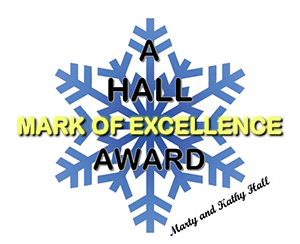 This World Cup coverage is made possible through the generous support of Marty and Kathy Hall and A Hall Mark of Excellence Award. To learn more about A Hall Mark of Excellence Award, or to learn how you can support FasterSkier’s coverage, please contact info@fasterskier.com.
This World Cup coverage is made possible through the generous support of Marty and Kathy Hall and A Hall Mark of Excellence Award. To learn more about A Hall Mark of Excellence Award, or to learn how you can support FasterSkier’s coverage, please contact info@fasterskier.com.
Five years on from the milestone of Olympic gold—and ten years on from the milestone of World Championship gold—the event was the same for US skiing; the Team Sprint. Socks adorned with stars and stripes and glittered faces led the race the whole day, as Jessie Diggins and Julia Kern traded leg after leg racing at the head of the women’s field. By the time Kern took her last turn around the Planica course, there was a pack of three teams, and no doubt which one had driven the race to that point. The medal places just had to be decided among the United States of America, Sweden, and Norway. In the end, the newly crowned sprint World Champion, Jonna Sundling, made the move for Sweden to win, and Tiril Udnes Weng held on for second, but the excitement would not be diminished. Jessie Diggins waited at the finish line as Julia Kern skied into her arms, bronze for the United States of America, and the first medal of these World Championships and Julia Kern’s career.
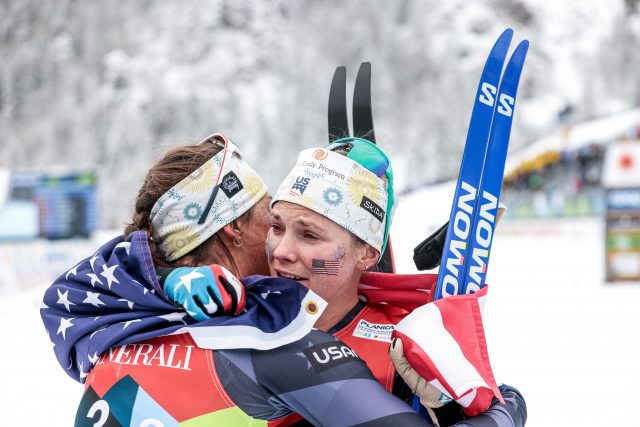
For the US, the pieces were all there, they had just moved around. Kikkan Randall—the other fixture of the Team Sprint’s triumphs of the past decade—was up in the commentary booth this time. Chad Salmela was alongside her, as ready as ever to play muse for the US Skiing community’s unadulterated excitement. Most notably though, Jessie Diggins was on the line at the beginning of the race. A surprise given her pre-World Championships assessment that “Anchoring relays is kind of my bread-and-butter.” But Diggins had also made her admiration of Julia Kern a central part of her assessment of the team events at this year’s World Championships, “Julia Kern has an incredible skill set that makes her a really good anchor,” Diggins said. “She’s got the fitness, the distance chops, the raw speed, tactics and confidence.”
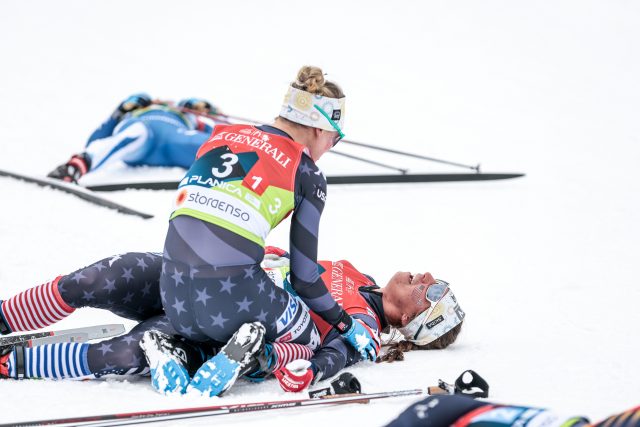
With that vote of confidence, the line-up for today’s American relay team was set. Diggins took the first leg, just as she had early in her career when paired up with Randall (the lineup that won in Val di Fiemme in 2013). Behind her in the anchor leg was the young American who had first sprinted to a World Cup sprint podium in Planica 2018, and in 2022-23, has spent the year building a steady and strong presence at the front of the World Cup sprint field. US Ski Team Head Coach Matt Whitcomb said on the decision in post-race comments that “If we switched [the lineup] around, we felt like it wouldn’t have used Jessie’s capacities or Julia’s capacities fully.” That lent to a US strategy to, as Julia Kern would put it in post-race comments to FasterSkier, “Win a medal the hard way,” stretching out the field out from the beginning to leave a small sprint pack for the medals at the end. For Matt Whitcomb, that led to the evaluation that “both [Jessie] and [Julia] have somewhat comparable finishing kicks. Jessie has a slightly more developed distance capacity. We felt that could be used on the first leg to really stretch things out, and then at times decide to push and others conserve a little bit throughout the race.”
And so, the American duo qualified first place on the day, went off the line in the Final that way, and didn’t relent until the very end.
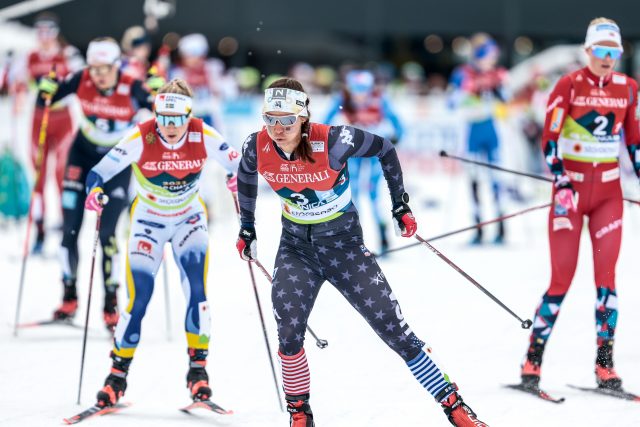
Women’s Team Sprint Final
The most candid and eloquent assessment of the Women’s relay Final would come from the source; Julia Kern’s mother. Talking to FasterSkier’s Nat Herz, she offered that for the US, “Either you chill behind [Norway and Sweden] and take a risk that you’re only going to get fourth or fifth with Germany and Finland there the whole time, or you say, ‘I’m going to the podium’ and push all three laps.’” She added a mantra too, “If you [choose] to push, you have to push the whole time.”
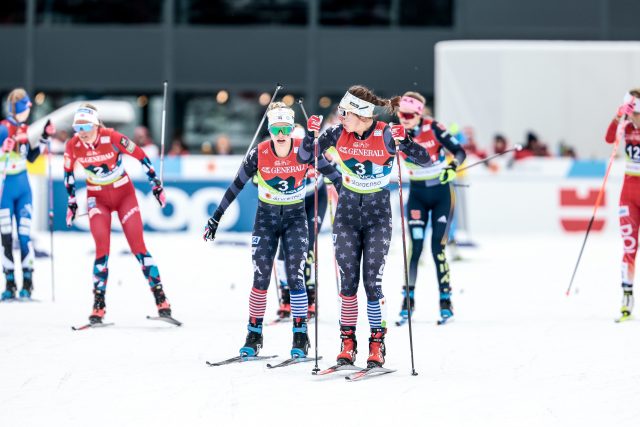
That was precisely what Jessie Diggins chose to do, launching out of the start-line into her trademark free skate as the field wound around the rolling descent at the beginning of the course. That course was a modified version of last Thursday’s individual sprint to include a relay zone, including the long-winding climb through the middle, with a long rolling section afterwards into the Planica stadium. To the spectator’s eye then, the race was spent looking for subtle signs of strength through the main climb. Who kept the V2 tempo high? Who was launching their V1 into full power mode? Through much of the race, that simply meant looking at the front. Diggins held a high-tempo V2 through all her legs that, even when challenged by Norway’s Anne Kjersti Kalvaa in her final leg, still kept the American at the front of the race.
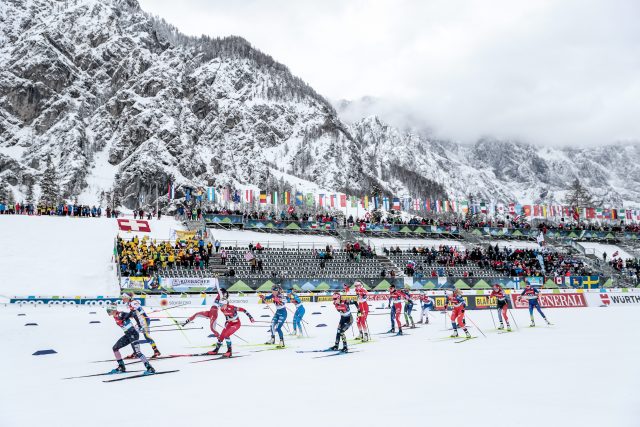
By that point, the race had long separated into a pack of five teams, with the Americans leading, Norway and Sweden taking turns marking behind in second and third, and Germany and Finland the same in fourth and fifth. The move from Kalvaa and the response from Diggins though, saw the pair take more speed into the long downhill after the climb their final time around, and it proved to be where the definitive gap of the day opened up. Emma Ribom was able to use her sprinting chops to put in a burst and make the race three team’s strong, but the Americans’ push had pushed Finland and Germany out of the race.
The final lap then was just to decide which medals would go where. Tiril Udnes Weng started the move on the lower reaches of the final main climb, which set Kern and Sundling into high gear too. Kern faded ever-so-slightly, what US Coach Matt Whitcomb would describe in post-race comments as “the side effect” of the US strategy, “Sweden and Norway get to follow up behind for five out of six laps.” As they rolled into the finishing stretch, Sundling passed Weng with the powerful finishing speed that won her a World Championship last Thursday, and Weng skied in to put Norway in second. Julia Kern continued to push all the way through, and as she approached, the energy from Diggins started to become a palpable thing, dancing and running to meet her younger teammates arms. For Diggins, it was the fourth time she had stepped onto a World Championships or Olympics Team Sprint podium, and this time, she was welcoming not just a younger teammate, but one that came from a generation that had directly looked up to her through all those previous wins.
That was a significance not lost on Julia Kern, who said in post-race comments that, “it was incredible to watch Jessie and Kikkan over the years when I was growing up, and to step into these shoes is truly special. It speaks to how they paved the way for the whole US team.”
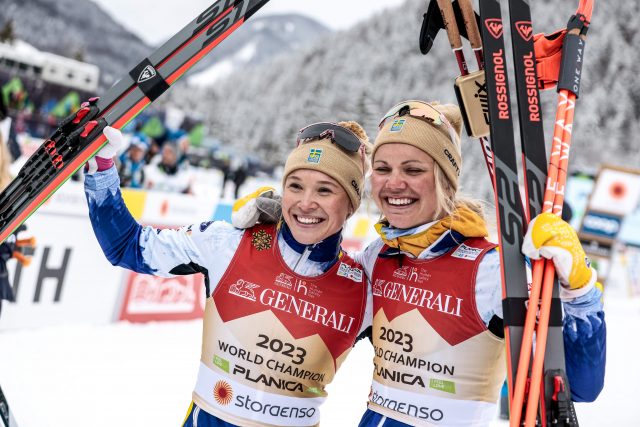
Throughout the US camp was the feeling that this bronze meant the continuation of all the positive developments in US skiing over the past decade and a half. For Jessie Diggins, today’s medal was a proof of concept for the team-centered focus she has helped pioneer, saying in post-race comments that “[The team sprint] a team sport within a team sport. It takes people who are on the road with us all the time, the [doctors and physios] who volunteer their time to come over and take care of us, this is a full team effort, and that’s what makes a team medal special.”
Matt Whitcomb, meanwhile, opted for extended metaphor, “[our Team Sprint] is like a multiple years long relay; Kikkan handing it off to Jessie, Jessie handing it off to Julia now, and maybe Julia hands it off to the next [skier] eventually.”
And as for the significance, Jessie Diggins continued to bring it all back home, “I hope the kids back at home see that you can do this; you can compete clean, support each other, train hard, and get it done. I hope they’ll see that.”
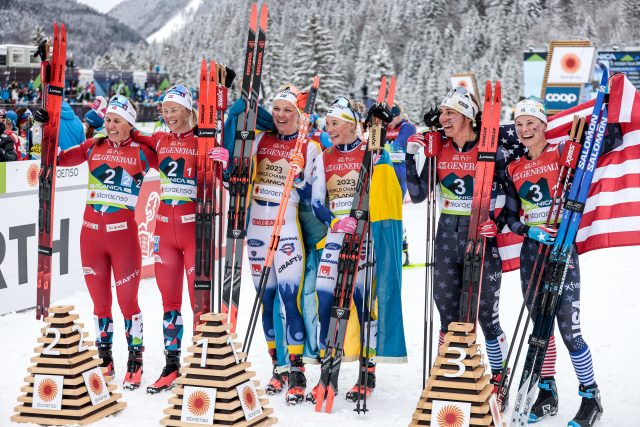
Women’s Team Sprint RESULTS
Ben Theyerl
Ben Theyerl was born into a family now three-generations into nordic ski racing in the US. He grew up skiing for Chippewa Valley Nordic in his native Eau Claire, Wisconsin, before spending four years racing for Colby College in Maine. He currently mixes writing and skiing while based out of Crested Butte, CO, where he coaches the best group of high schoolers one could hope to find.



